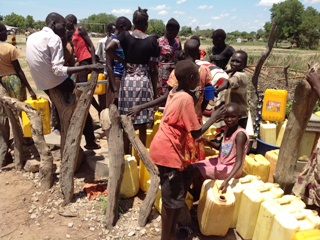Education still eludes S. Sudanese refugees in Uganda
April 24, 2014 (RHINO CAMP) – Emmanuel Peter Gai, a secondary school student, sits at Rhino camp refugee settlement in Uganda with little hope for further education.

The camp, located more than 1,000km from Uganda’s capital, Kampala currently hosts about 15,000 South Sudanese refugees who fled the violence that hit the new nation in mid-December last year, displacing an estimated over a million people.
David Abili, an assistant camp resettlement officer says only one secondary school existed in Rhino camp, but remains nonoperational after its students were repatriated.
“There is somebody [a private person] who is planning to open that school. Although it is going to private, it needs school fees from our clients but basically the refugees are desperate that they cannot afford to pay school fees,” Abili told Sudan Tribune.
“So we have challenges in secondary education for our clients who are basically refugee students,” he stressed.
The official cited lack of learning facilities as another major setback to education in the camp, but acknowledged that the United Nations Children Fund (UNICEF) had supplied some tents to act as classrooms.
South Sudanese refugees at the camp earlier complained about water shortage in the same camp and lack of access to education worsens their dire humanitarian situation.
Many of the parents Sudan Tribune interviewed expressed fears that lack of access to education for their children could hamper their chances for successful future life.
Peter Lam Gatluak, a parent, says most of their children were idle due to lack of schools, adding that the existing primary schools even lacked basic learning facilities.
“Most of the children in camp sit idle without going to school. But most of those in senior four and senior six or those who completed primary cannot continue due to lack of secondary schools,” Gatluak said.
“That is why you have seen them rooming around the camp,” he added.
Rhino camp was a home to South Sudanese refugees earlier in the early 90’s, but the 2005 Comprehensive Peace Agreement (CPA), which ended over two decades of the North-South Sudan civil war saw them repatriated back to their country.
(ST)
